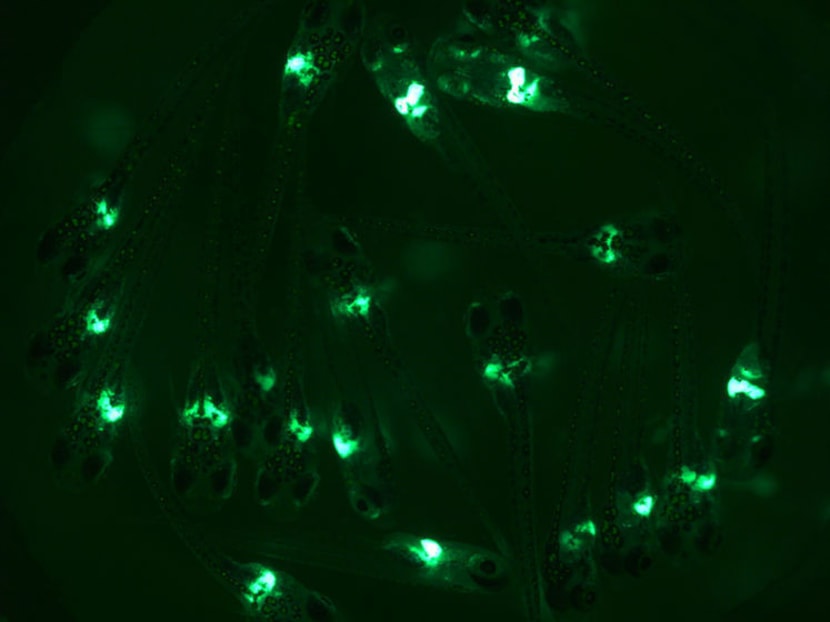Green-glowing minnows turn product-safety pawns in China
HONG KONG – Tiny fish that glow green and morph in the presence of toxins are joining front-line efforts in China to improve product safety.

Transgenic medaka eleuteroembryos illuminated in response to estrogens or estrogen like chemicals are seen through a microscope in Hong Kong, China. Photo: Bloomberg
HONG KONG – Tiny fish that glow green and morph in the presence of toxins are joining front-line efforts in China to improve product safety.
Backed by a well-known Chinese venture capitalist, Hong Kong-based startup Vitargent (International) Biotechnology says its developed fish-based tests for more than 1,000 toxic chemicals that could help companies from drugmakers to food manufacturers identify disease-causing contaminants.
The technique relies on young transgenic zebrafish and medaka fish whose development is altered in specific ways by known toxins, indicating potential harm to human health. Vitargent’s US$300 (S$401) screening test, which takes about two days to complete, could speed up product safety checks in a country beleaguered by scandals over tainted items, founder Eric Chen said.
“Fish models are suitable for screening large amounts of toxins quickly, which is why they are a way of the future,” said Mr Brian Priestly, a toxicologist at Monash University’s Australian Centre for Human Health Risk Assessment, who isn’t involved with the company.
Dogs, monkeys and rodents have been used in the past to gauge potential harm from chemicals, but now scientists are trying to avoid using them as models of human diseases for ethical and economic reasons, Mr Priestly said.
FECUND FISH
The potential to safeguard product safety and integrity, both in China and abroad, is what prompted an investment in Vitargent by Mr Peter Liu, a Chinese venture capitalist whose company WI Harper manages US$750 million of assets.
“We would like to help bring up the standards of global regulation through Vitargent’s innovation,” said Ms Yvonne Chen, a partner at WI Harper who led the firm’s undisclosed investment. “When we are able to take the existing regulation to the next level, consumers will have more confidence in the products and better protection.”
Zebrafish, known scientifically as Danio rerio, are increasingly popular substitutes. Native to the freshwaters of the Himalayan region, the inch-long stripy minnows metabolise drugs using similar biological pathways as humans. They’re also prolific, becoming sexually mature after a few months, with each pair producing 200 to 300 offspring a week.
It’s the transparent embryos, which develop outside the mother, that are used in toxicology studies because their development – both inside and out – can be easily observed.
Vitargent’s fish glow green in the presence of certain toxins and grow extra tails and tumours after exposure to other harmful chemicals, said co-founder Xueping Chen, a biologist who spent a decade studying the testing method.
Food safety is a particular area of focus for the founders. In China, trust in some products is so shaky that parents scour the world to buy milk powder for their babies.
“Ten years ago no one was really paying attention to food safety,” said Mr Eric Chen. “But now it’s on top of everyone’s list.” BLOOMBERG





